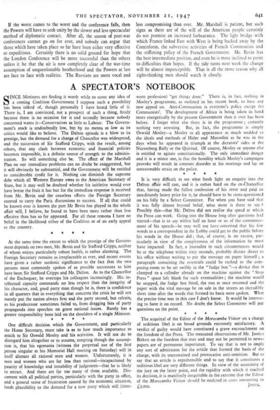* * * *
It is very difficult to see what fresh light an enquiry into the Dalton affair will cast, and it is rather hard on the ex-Chancellor that, having made the fullest confession of his error and paid an inordinately heavy price for it, he should have to be cross-questioned on his folly by a Select Committee. For when you have said that it was folly almost beyond belief, what more is there to say ? Possibly this—that Mr. Dalton did not realise the speed at which the Press can work. Going into the House long after questions had started—that is to say within half an hour or so of the commence- ment of his speech—he may well not have conceived that his few words to a correspondent in the Lobby could get to the public before his words in the House did ; that, of course, is no excuse, par- ticularly in view of the completeness of the information he must have imparted. In fact, a journalist in such circumstances would be at the telephone within sixty seconds, probably dictate direct to his office without waiting to put the message on paper himself ; a paragraph containing the essentials could be rushed to the com- posing-room to be set swiftly in the " fudge box "—a device that is clamped to a cylinder already on the machine against the " Stop Press " space left blank for such eventualities ; the machine would be stopped, the fudge box fitted, the run at once resumed and the paper with the vital message be on sale in the streets an incredibly short time after the words that formed its basis were spoken. What the precise time was in this case I don't know. It would be interest- ing to have it on record. No doubt the Select Committee will put questions on the point.
* * * *


































 Previous page
Previous page